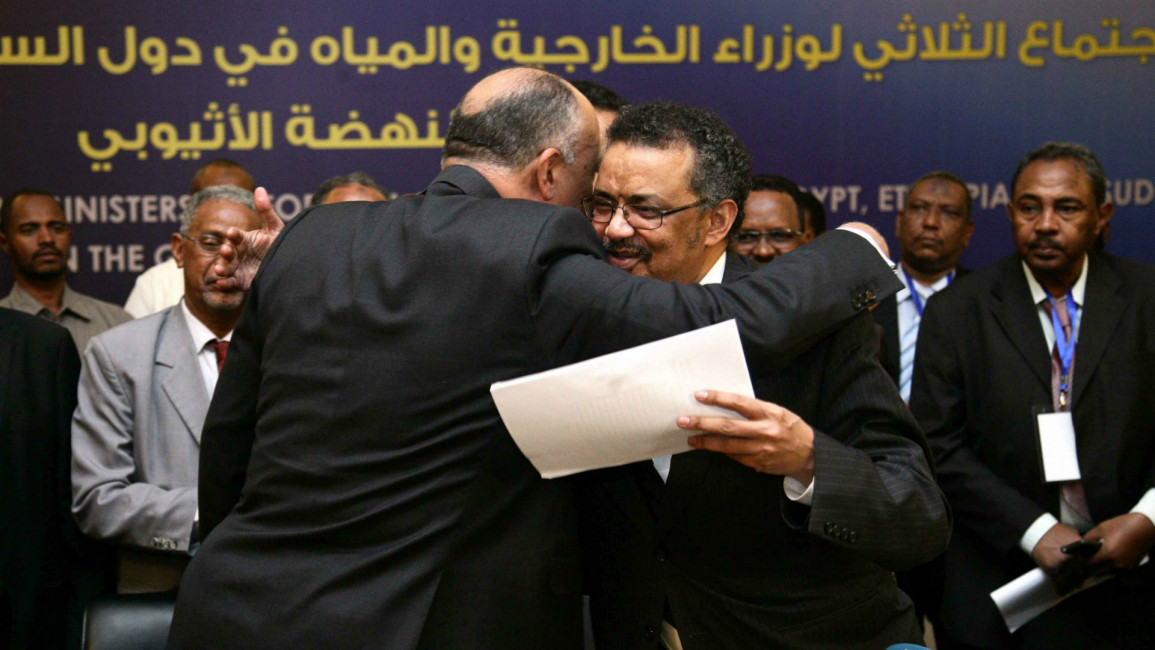Egyptian opposition slams Renaissance Dam agreement with Ethiopia
Egyptian opposition slams Renaissance Dam agreement with Ethiopia
Egypt finalised a deal with Ethiopia giving the Renaissance Dam Project the go-ahead, as opposition figures issue a statement warning of 'disastrous consequences.'
2 min read
Foreign ministers for Egypt and Ethiopia embrace following the finalisation of the deal [Getty]
The Renaissance Dam Project is due to go ahead after Egypt, Ethiopia and Sudan signed an agreement this week, but the deal has been met with criticism from opposition figures.
Two French engineering companies were chosen on Tuesday to carry out environmental impact studies on Ethiopia's planned Grand Renaissance Dam on the Nile River, at a two-day meeting in the Sudanese capital.
Khartoum's chief diplomat, Ibrahim Ghandour, said firms BRL and Artelia had been tapped to begin work on the dam.
The deal is based on a preliminary agreement that was reached in March between the leaders of the three countries in Khartoum.
Egypt draws about 90 percent of its water from the Nile, which runs from Khartoum to the south, where the Blue and White Nile rivers converge.
The country was concerned the dam could negatively affect the supply.
Under treaties signed in 1929 and 1959, Egypt and Sudan together are entitled to use 87 percent of the Nile's waters.
At a meeting in Khartoum with Egyptian President Abdel Fattah al-Sisi and his Sudanese counterpart Omar al-Bashir, Ethiopian Prime Minister Hailemariam Desalegn assured them the project would "not harm our three countries, and in particular the Egyptian people".
The dam is designed to feed a hydroelectric project that will produce 6,000 megawatts.
But in Egypt, the agreed plan was slammed by a collective of opposition figures, parliamentarians and public figures, who felt that Sisi had conceded too much in the deal.
In a statement, signed by opposition figures including Gamal Heshmat, Hetem Azzam and Seif Abdel-Fattah, they said that Ethiopia would "not have dared" to go ahead with the dam project if Sisi had not signed the agreement.
The deal carries "an existential threat to the Egyptian State and its people," thye added and warned of "disastrous consequences" for Egypt if the dam goes ahead.
The statement also accused Sisi of continuing to commit human rights abuses in Egypt.
"At a time when the country is threatened from every side, the Sisi regime continues to repress, arrest and torture before the anniversary of the 25 January Revolution," the statement read.
Recent arrests have included dozens of students, workers, political activists, civilians and journalists.
Two French engineering companies were chosen on Tuesday to carry out environmental impact studies on Ethiopia's planned Grand Renaissance Dam on the Nile River, at a two-day meeting in the Sudanese capital.
Khartoum's chief diplomat, Ibrahim Ghandour, said firms BRL and Artelia had been tapped to begin work on the dam.
The deal is based on a preliminary agreement that was reached in March between the leaders of the three countries in Khartoum.
Egypt draws about 90 percent of its water from the Nile, which runs from Khartoum to the south, where the Blue and White Nile rivers converge.
The country was concerned the dam could negatively affect the supply.
Under treaties signed in 1929 and 1959, Egypt and Sudan together are entitled to use 87 percent of the Nile's waters.
At a meeting in Khartoum with Egyptian President Abdel Fattah al-Sisi and his Sudanese counterpart Omar al-Bashir, Ethiopian Prime Minister Hailemariam Desalegn assured them the project would "not harm our three countries, and in particular the Egyptian people".
The dam is designed to feed a hydroelectric project that will produce 6,000 megawatts.
But in Egypt, the agreed plan was slammed by a collective of opposition figures, parliamentarians and public figures, who felt that Sisi had conceded too much in the deal.
In a statement, signed by opposition figures including Gamal Heshmat, Hetem Azzam and Seif Abdel-Fattah, they said that Ethiopia would "not have dared" to go ahead with the dam project if Sisi had not signed the agreement.
The deal carries "an existential threat to the Egyptian State and its people," thye added and warned of "disastrous consequences" for Egypt if the dam goes ahead.
The statement also accused Sisi of continuing to commit human rights abuses in Egypt.
"At a time when the country is threatened from every side, the Sisi regime continues to repress, arrest and torture before the anniversary of the 25 January Revolution," the statement read.
Recent arrests have included dozens of students, workers, political activists, civilians and journalists.


![President Pezeshkian has denounced Israel's attacks on Lebanon [Getty]](/sites/default/files/styles/image_684x385/public/2173482924.jpeg?h=a5f2f23a&itok=q3evVtko)



 Follow the Middle East's top stories in English at The New Arab on Google News
Follow the Middle East's top stories in English at The New Arab on Google News


